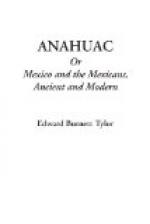There are streets of good Spanish houses in Vera Cruz, built of white coral-rock from the reefs near the shore, but they are mildewed and dismal-looking. Outside the walls is the Alameda; and close by is a line of houses, uninhabited, mouldy, and in ruins. We asked who built them. “Los Espanoles,” they said.
Even now, when the “nortes” are blowing, and the city is comparatively healthy, Vera Cruz is a melancholy place, with a plague-stricken look about it; but it is from June to October that its name, “the city of the dead”—la ciudad de los muertos—is really deserved. In that season comes an accumulation of evils. The sun is at its height; there is no north wind to clear the air; and the heavy tropical rains—more than three times as much in quantity as falls in England in the whole year—come down in a short rainy season of four months. The water filters through the sand-hills, and forms great stagnant lagoons; a rank tropical vegetation springs up, and the air is soon filled with pestilential vapours. Add to this that the water is unwholesome; the city too is placed in a sand-bath which keeps up a regular temperature, by accumulating heat by day and giving it out into the air by night, so that night gives no relief from the stifling closeness of the day. No wonder that Mr. Bullock, the Mexican traveller, as he sat in his room here in the hot season, heard the church-bells tolling for the dead from morning to night without intermission; for weeks and weeks, one can hardly even look into the street without seeing a funeral.
We turned back through the city, and walked along watching the Zopilotes—great turkey-buzzards—with their bald heads and foul dingy-black plumage. They were sitting in compact rows on parapets of houses and churches, and seemed specially to affect the cross of the cathedral, where they perched, two on each arm, and some on the top. When some offal was thrown into the streets, they came down leisurely upon it, one after another; their appearance and deportment reminding us of the undertaker’s men in England coming down from the hearse at the public-house door, when the funeral is over. In all tropical America these birds are the general scavengers, and there is a heavy fine for killing them.[4]
Scarcely any one is about in the streets this afternoon, except a gang or two of convicts dragging their heavy chains along, sweeping and mending the streets. This is a punishment much approved of by the Mexican authorities, as combining terror to evil-doers with advantage to the community. That it puts all criminals on a level, from murderers down to vagrants, does not seem to be considered as a matter of much consequence.




